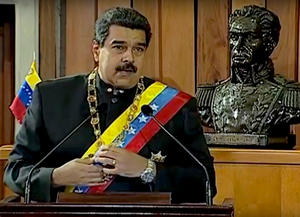Hemispheric securityVenezuelan government's death squads kill thousands: UN
A UN report published Thursday has detailed the extrajudicial executions of thousands of young men by the special forces of the government of Nicolas Maduro in Venezuela. The report offers evidence that that the Venezuelan government’s death squads are carrying out Maduro’s broad strategy for neutralizing the opposition to his regime and eliminating political opponents.

A UN report published Thursday has detailed the extrajudicial executions of thousands of young men by the special forces of the government of Nicolas Maduro in Venezuela. The report offers evidence that that the Venezuelan government’s death squads are carrying out Maduro’s broad strategy for neutralizing the opposition to his regime and eliminating political opponents.
The New York Times reports that the Venezuelan security forces have been sending death squads – their official name is Special Action Forces — to carry out extrajudicial killings of young men. The UN 16-page report says that the crime scenes are then staged to make it look like the victims were resisting arrest.
The government’s death squad killed 5,287 supporters of the opposition in 2018, and additional 1,569 between January and May 2019.
The report offers a detailed and disturbing picture of a lawless and arbitrary system of oppression, in which the authoritarian Maduro regime uses internal intelligence provided by Cuban and Russian intelligence operatives sent by their governments to Venezuela to help prop-up the regime. The UN report stresses that the actual number of deaths could be much higher. The report cites accounts by independent groups who report more than 9,000 killings for “resistance to authority” over the same 18-months period.
The report says that since 2016, the government has pursued a strategy “aimed at neutralizing, repressing and criminalizing political opponents and people critical of the government.”
The Guardian reports that the report includes harrowing accounts of twenty families, who say that masked men dressed in black from the Special Actions Forces (FAES) arrived at their homes in black vehicles without license plates. They then broke into their houses, assaulted the women and girls and stole belongings.
“They would separate young men from other family members before shooting them,” the report said.
“In every case, witnesses reported how FAES manipulated the crime scene and evidence. They would plant arms and drugs and fire their weapons against the walls or in the air to suggest a confrontation and to show the victim had ‘resisted authority.’”
The Times notes that the Special Action Forces, known by their Spanish acronym FAES, are nominally tasked with combating drug trafficking and crime, but UN human rights officials said the Venezuelan government was using these and other security forces “as an instrument to instill fear in the population and to maintain social control.”
The report is especially noteworthy because of the team of investigators which wrote it. The team was assembled and led by the UN human rights chief Michelle Bachelet, a former leftist Chilean politician who served as president of Chile from 2010 to 2018. In her second term as Chile’s president, from 2014 to 2018, she was among the few South American leaders who refused openly to criticize Maduro’s growing authoritarianism.
The Venezuelan government, counting on Bachelet’s past left-leaning policies, was hoping that her team’s visit and investigation would bolster Maduro’s international legitimacy. Bachelet’s team was given unusual access inside Venezuela, unlike that given to any previous UN agencies. Maduro heavily publicized his meeting with Bachelet and promised to consider allowing her to open a full-time office in the country.
Bachelet, however, disappointed the Maduro government, and her honest and disturbing report was described as “openly biased” by the regime.
